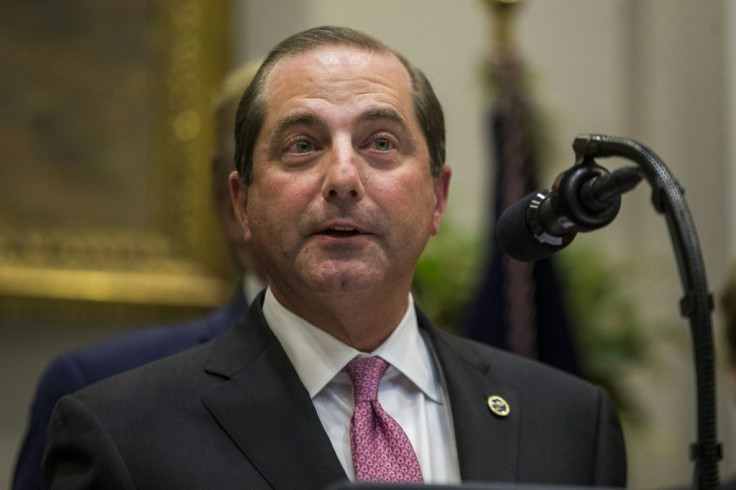Coronavirus US Death Toll Surpasses 90,000, Still Azar Calls Trump's COVID-19 Response 'Historic'

KEY POINTS
- Azar echoed Trump's claims the U.S. has conducted more COVID-19 tests than any other country in the world
- He thanks "the President's historic response efforts" for this outcome
- He also noted many complicating medical factors like obesity, hypertension and diabetes increase the likelihood an American will die from COVID-19
Brushing aside a warning from the U.S. Centers for Disease Control and Prevention (CDC) the country's death toll from COVID-19 will exceed 100,000 by June 1, the Trump administration is instead touting the "historic" success of its push to test millions of Americans for the coronavirus.
Leading this was Health and Human Services secretary Alex Azar, who bragged on CNN Sunday the administration had conducted 10 million tests over the last few months.
"Thanks to the president's historic response efforts here and the collaborative work of governors and heroic health care workers on the frontlines, we are in a position to reopen," said Azar.
Many health experts say the administration's total coronavirus tests are insufficient given the U.S. population of 329 million. Other health experts also assert that testing per capita (or tests per one million persons) is the preferred metric for gauging the true success of any nationwide testing effort.
The U.S. had 1.53 million confirmed COVID-19 cases and 91,000 deaths as of 11:00 p.m. ET Sunday, according to Worldometer. It still leads the world in cases and deaths.
In making the 10 million tested claim, Azar echoed comments made by President Donald Trump last Thursday. At the same time, Trump also said the U.S. would only have a few confirmed COVID-19 cases today if it didn't test so much.
In his visit to a medical supply distributor in Pennsylvania, Trump praised himself and his administration for its coronavirus response, including ramped-up testing.
“America has now conducted its 10 millionth test," said Trump. "That’s as of yesterday afternoon. Ten million tests we gave. Ten million."
He also said testing will be boosted.
"And don’t forget, we have more cases than anybody in the world,” he pointed out. “But why? Because we do more testing. When you test, you have a case. When you test, you find something is wrong with people. If we didn’t do any testing, we would have very few cases.”
Trump continued to dismay by alleging the news media still refuses to report this “common sense” explanation of his for America’s high case numbers. He repeated the claim the U.S. has tested more people than other countries, ignoring the truth the U.S. doesn't lead the world in testing per capita. He again said testing is overrated.
“So we have the best testing in the world,” claimed Trump. “It could be the testing’s, frankly, overrated? Maybe it is overrated. But whatever they start yelling, we want more, we want more. You know, they always say we want more, we want more because they don’t want to give you credit.”
On Sunday, CNN's Jake Tapper pointed out "the U.S. has less than 5% of the world's population but has 30% of the world's officially reported coronavirus deaths" and asked Azar how this can be called a success.
Azar said the high death toll can be blamed on some Americans choosing unhealthy lifesyles. He pointed to the many complicating medical factors like obesity, hypertension and diabetes that increase the likelihood an American will die from COVID-19.
"Every death is a tragedy, but the results could have been vastly, vastly worse," he said, echoing Trump's comments.
"Unfortunately, the American population is a very diverse and it is a population with significant unhealthy comorbidities that do make many individuals in our communities, in particular, African Americans and minority communities, particularly at risk here, because of significant underlying disease health disparities and disease comorbidities and that is an unfortunate legacy in our health care system that we certainly do need to address," said Azar.
© Copyright IBTimes 2025. All rights reserved.




















